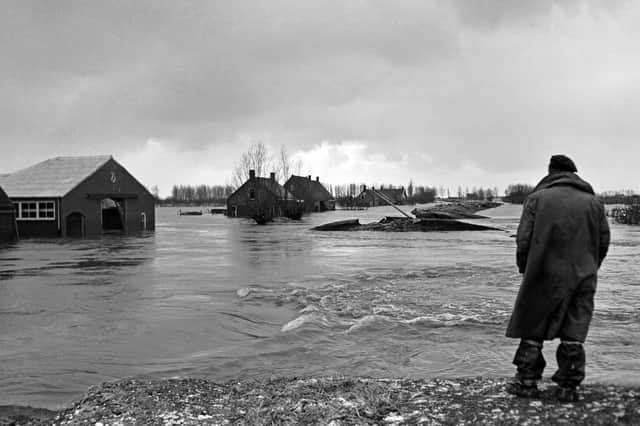Will I be a hero when natural disaster strikes? writes Steve Canavan


I’d like to think I would but fear, in reality, I’d be the one that – with fire spreading through a town centre building – would turn and run for his life, screaming ‘I want my mummy’ while trampling over a frail pensioner along the way.
This thought occurred to me again the other day as I was sat idly watching the TV, pretending to listen to Mrs Canavan ramble on about something our son had got up to at nursery.
Advertisement
Hide AdAdvertisement
Hide AdShe does this a lot and I’m not sure why as surely she must have noted from my body language and lack of response that I have absolutely no interest in the fact our two-year-old made a rocket out of an old toilet roll and some cotton wool – which is usually what the anecdote is about.
Anyway, just as she’d moved on to telling me another thrilling tale about how she was debating whether to get Mary, our daughter, a pink waterproof coat with a picture of a unicorn on, a report came on the tele about the North Sea flood of 1953, which I found absolutely fascinating because – rather shamefully - I’d never before heard of it and yet it was a shockingly awful and tragic event that killed so many people on the British mainland.
To jog your memory, 1953 was same year Joseph Stalin died, Elvis Presley recorded his first songs, Hugh Hefner established Playboy, and Status Quo’s Francis Rossi last had his haircut.
On this very same weekend all those years ago, a big storm formed just south of Iceland and hurricane-force winds pushed it across the North Sea. A sudden drop in barometric pressure - which is basically air pressing down on the sea (I definitely didn’t google that) – caused the sea level to dramatically rise, creating a storm surge and forming a wave 18 foot in height.
Advertisement
Hide AdAdvertisement
Hide AdIt smashed the coastlines of Britain, and then, later, as the wave careered on, Belgium and Holland, where the water breached sea defences and raced inland.
The results were pretty catastrophic. 307 people died in Lincolnshire, Norfolk, Suffolk and Essex, 28 were killed in Belgium, 19 in Scotland, and 1,836 in Holland, where the damage was most extensive (30,000 animals drowned, 47,000 buildings damaged or swept away, 70,000 people evacuated).
Those were the people on land. Think of all the poor folk out at sea at the time in boats. Dozens of fishing trawlers were tossed into the air and sank, as well as a ferry off the coast of near Belfast with 133 on board.
The damage done in Britain wasn’t quite as extensive as that suffered in Holland but it was still great - in Canvey Island, on the River Thames estuary in Essex, for example, 59 people died.
Advertisement
Hide AdAdvertisement
Hide AdBut when disaster strikes – and this leads back to how I started this article – there are always those folk in society, who, unlike me, rise to the task.
In Lincolnshire, two police offers – Charles Lewis and Leonard Deptford (because they deserve to be named) – leapt, like one of the more far-fetched scenes in a James Bond movie, from the upper window of a police station to save an elderly couple being swept away. The officers realised there would be many other aged folk vulnerable and worked tirelessly for hours to pluck many to safety. At one house they discovered a bedridden elderly couple with their panicked middle-aged daughter in waist-high water and so – and if this doesn’t earn them a Blue Peter badge I don’t know what will - lashed together oil cans and items from the kitchen to make a makeshift raft, to which they tied the couple on to. The pair received George Medals for their actions and, possibly, their own Channel 5 documentary about how to make a floating vessel from everyday household materials.
Meanwhile an American airman named Reis Leming, based at a US army base in Norfolk, decided to help those in trouble. Despite the fact he couldn’t swim – a bit of a drawback in a flood situation – he waded through the deep water while dragging behind him an inflatable raft and spent seven hours rescuing people. Just as he hauled his 27th person to safety, he collapsed from exhaustion and hypothermia.
Rather beautifully, when Leming got married later that year back in the US, the women of the town of Hunstanton – where he carried out his one-man rescue mission – pooled their sugar together (sugar was still rationed in England at the time) and baked a huge wedding cake, which was then shipped over to America.
Advertisement
Hide AdAdvertisement
Hide AdIn 1993 Leming returned to Norfolk to attend a memorial service for the disaster, at which the Queen officially thanked him for his actions on that night 40 years earlier. And when he died 10 years ago, at the ripe old age of 82, Hunstanton Town Council approved a motion to name a footpath in the town, ‘Reis Leming Way’. Ah, I love stuff like that.
In the immediate aftermath of the tragedy, the government made huge investments to install new, bigger and better sea defences and work began on the Thames Barrier to protect against future storm surges.
It remains the worst flood of the last century in Britain. And if, like me, you didn’t know about it before, you do now.
Thanks for reading. If you value what we do and are able to support us, a digital subscription is just £1 for your first month. Try us today by clicking here